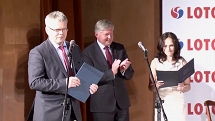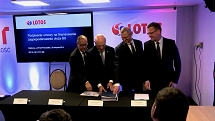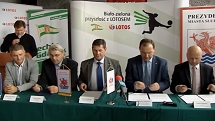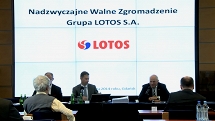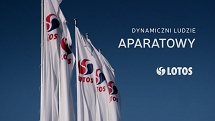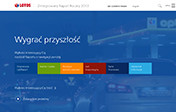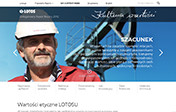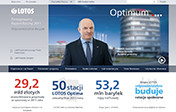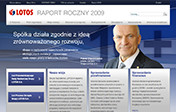-
Financial information
The past year ushered in a series of challenges for the companies in the fuel sector. The decisions made by us have demonstrated that we are able to take rapid steps to adapt to a demanding environment and ensure the desired profitability for our projects.
-
Segment performance
The segmental management model we have implemented enhances management efficiency, delivering cost and revenue synergies across the organization.
-
Letter from the Vice-President of the Board
2014 ushered in a series of challenges for the companies in the fuel sector. The decisions made by the LOTOS Group have demonstrated that we are able to take rapid steps to adapt to a demanding environment and ensure the desired profitability for our projects.
-
Business environment
The key factor that had a strong impact on both the global and Polish petroleum markets in 2014, with significant consequences for the LOTOS Group’s performance, was the price of crude oil, which also determined the price of petroleum products.
-
Strategic objectives
The LOTOS Group’s Strategy is designed to strengthen our position as a strong, innovative and efficient business which plays a major role in ensuring national energy security.
-
Business model
Our operations consist in crude oil production and processing, as well as wholesale and retail sale of petroleum products, among which are: fuels (unleaded gasoline, diesel oil and light fuel oil), heavy fuel oil, bitumens, aviation fuel, naphtha, propane-butane LPG and base oils.
-
Risk and opportunities
At the LOTOS Group, we identify a range of diverse risks, which may affect all areas of our business. The key risks in terms of their impact on our operations are the financial risks as well as risks affecting the exploration and production area. In the analysis of the risks, we also factor in issues related to sustainable development.
-
Key data 2014
With revenue of ca. PLN 28.5bn in 2014, we rank fourth in the group of 500 largest businesses in Poland.

Financial segment
Grupa LOTOS’ structures include the Financial Risk Management Office responsible for coordinating and supervising steps taken to ensure that decisions made by LOTOS Group companies are optimised in terms of financial risks. Its activities are designed to ensure that the financial risk management policy is up-to-date, consistent and in line with Grupa LOTOS’ strategic objectives, and to provide for operational efficiency, effectiveness and security of the financial risk management process. The Company also has in place a Price Risk and Trading Committee, whose main task is to supervise and support price risk management at Grupa LOTOS in relation to prices of crude oil, petroleum products (including biofuels and biocomponents), natural gas and other raw materials, as well as prices of CO2 emission allowances and electricity. (See more)
1. Risk related to prices of raw materials and petroleum products
Grupa LOTOS’ revenue from sale of petroleum products is largely dependent on the difference between the price of petroleum products and the price of crude oil. The prices may be subject to significant fluctuations in response to developments that are outside the Company’s control, including mainly changes in the global and regional supply and demand, the geopolitical situation, and the related market expectations. Movements in the prices of crude oil and other feedstock used in the refinery business (including natural gas) and fluctuations in the prices of Grupa LOTOS’ petroleum products may not be correlated in time, which may cause significant volatility of our refining margin.
To better manage the feedstock and petroleum products price risk, in 2014 we implemented a new ETRM (Energy Trading and Risk Management) system. In February 2015, a new feedstock and petroleum products price risk policy was approved.
2. Risk related to prices of carbon (CO2) allowances
In 2014, Grupa LOTOS managed the entire phase III of the EU CO2 Emissions Trading Scheme covering the 2013−2020 trading period. In the previous year, year 2020 was not included in the risk management horizon given the lack of liquidity on the futures market and the instability of the underlying position. (See more)
3. Liquidity risk
This is one of the key risks to the security of the Company’s operations, involving its ability to discharge all liabilities in a timely manner. It may result from a mismatch between the streams of receivables and payables or inadequate sources of financing. Liquidity is managed for the entire organization based on current liquidity forecasts. The process consists in using an appropriate selection of financial instruments (including cash pooling and diversified sources of financing), optimising the working capital position (including payment terms at LOTOS Group companies and under trading contracts) and applying IT solutions to improve the security and effectiveness of the process.
4. Currency risk
The Polish złoty (PLN) is the reporting and functional currency for Grupa LOTOS and the majority of other LOTOS Group companies, while the trading prices of crude oil and petroleum products are generally denominated in, or tied to, the US dollar (USD). Therefore, we have a structural long position in USD (it benefits from a rise in the USD/PLN exchange rate) as its cash inflows dependent on the USD exchange rate (mainly revenue from sale of petroleum products) are higher than the corresponding cash outflows (e.g. on purchase of crude oil or credit facility repayment). Moreover, the US dollar was chosen by most of the LOTOS Group companies as the currency for contracting and repaying long-term investment facilities. A document entitled ‘The Strategy of Currency Risk Management at Grupa LOTOS’ was formally adopted by the Company to manage its currency risk. The LOTOS Group also operates a so-called Group Bank that allows LOTOS Group companies to enter into FX transactions with Grupa LOTOS, improving the efficiency of currency risk management.
5. Interest rate risk
Grupa LOTOS is exposed to interest rate risk, with interest rates growth translating into increased costs of servicing debt under floating-rate bank and non-bank borrowings. The risk is related primarily to the expected schedule of payments under the loans taken out to finance inventories and the 10+ Programme and the resulting amount of interest accruing at USD LIBOR.
6. Credit risk in financial transactions
When entering into transactions with financial institutions, we take into account the risk of the counterparty’s default. We mitigate the risk by transacting only with creditworthy financial institutions or companies, or by executing transactions on the basis of guarantees issued by a financial institution or company with an appropriate credit rating and meeting the relevant requirements of Grupa LOTOS. Credit limits in financial transactions are determined with reference to the Company’s equity and a ratio calculated based on agency credit ratings updated on an ongoing basis. The utilisation of credit limits is regularly monitored.
7. Credit risk in trade transactions
In the course of our trading operations, we sell products and services to businesses on a deferred payment basis, which may give rise to a risk of the customer’s default. We adopted an internal procedure whereby creditworthiness of trading partners seeking an open credit limit must be verified. Grupa LOTOS grants such limits based on assessment of partners’ creditworthiness, taking into account the available data and information. The final decision on the amount of trade credit limit is made by persons responsible for credit decisions in line with their assigned responsibilities. The utilisation of credit limits is monitored on an ongoing basis.
8. Risk of limited access to external financing or changes in lending terms, and risk related to debt servicing
Some of Grupa LOTOS’ investment projects and, to a limited extent, day-to-day activities of some of the Company’s subsidiaries are (or are intended to be) financed with debt. Therefore, there is a risk that the LOTOS Group companies may find it difficult to raise new financing or obtain financing in the required amount or on acceptable terms. This may be due to an unstable situation on financial and capital markets in Poland and abroad, more restrictive policies adopted by lenders with respect to new agreements or interpretation and performance of existing agreements, adverse economic developments in Poland or abroad, and non-performance or improper performance of contractual obligations under the financing agreements by LOTOS Group companies.
The ability to secure new debt financing is also limited by the LOTOS Group companies’ obligations related to servicing of existing debt. In addition, debt agreements impose a number of non-financial obligations and restrictions on the companies, related in particular to their ability to engage or refrain from engaging in certain activities or operations during the repayment period, as well as the requirement to comply with certain disclosure obligations towards the financing institutions. Any failure by a LOTOS Group company to make timely payments as required under the terms of financing or to meet non-financial obligations may result in acceleration of the debt, along with debt incurred under other financial agreements or instruments. The lenders may also enforce their claims against security, including collateral established over the companies’ assets.
We mitigate the risk through integrated reporting on current and planned liquidity of LOTOS Group companies (including expected deficits which may require arrangement of debt or intra-Group financing). The majority of LOTOS Group companies participate in a cash pooling arrangement. In addition, the financial functions at the companies monitor the obligations assumed by a given company under debt financing agreements on an ongoing basis, including obligations relating to debt service, information disclosure, maintenance of certain financial ratios and covenants as well as discharge of other obligations towards financial institutions. We maintain relationships with a diversified group of creditworthy partners, and we secure debt financing (or amend existing debt financing agreements) using the ‘Procedure for managing debt and coordinating debt financing at the LOTOS Group’, which applies to all LOTOS Group companies. The credit rating and overall standing of the banks providing financing are also monitored, as are any factors driven by developments on the global financial markets that may threaten the LOTOS Group’s ability to raise financing domestically and globally.
9. Risk of adverse changes in tax regulations, interpretations or court rulings
This risk may result in higher tax burden (excise duty, real estate tax, CIT), and give rise to tax risk in transactions where such risk was previously non-existent. Frequent amendments to the tax legislation and difficulties in interpreting and applying tax laws hinder Grupa LOTOS’ day-to-day work and smooth tax planning at the organization. They are also a source of uncertainty as to the application of tax regulations in the Company’s everyday business and give rise to the risk of errors. In addition, tax laws are often interpreted and applied by tax authorities in an inconsistent manner.
For fuel sector companies, excise duty is the most problematic tax, given the substantial amount of the tax liability and the complex nature of excise regulations. Excise tax legislation is detailed, imposes a large number of diverse obligations on the taxpayers, and contains regulations which are mutually contradictory (sometimes even within the same legal act). Property tax laws also give rise to numerous interpretation uncertainties, in particular with respect to the tax base and the determination of items subject to the tax.
Given the above, LOTOS Group companies which operate substantial technical infrastructure equipment located on properties are exposed to the risk of disputes with tax authorities, in particular with respect to the interpretation and application of the definition of a structure under the Local Taxes and Charges Act (Dz.U. of 1991 No. 9 item 31). Where a tax risk arises from possible disparate interpretations of a law, we request the Minister of Finance to present a binding interpretation of such law. As a member of respectable organizations of employers and entrepreneurs, we also voice our opinions on proposed bills and are thus able to respond appropriately to the changing legal environment. In light of the numerous changes in interpretation of the tax laws and the introduction of new regulations, we regularly update our internal procedures to ensure compliance with legal requirements and to identify and mitigate any tax risks, particularly their effect on the LOTOS Group’s financial statements.












